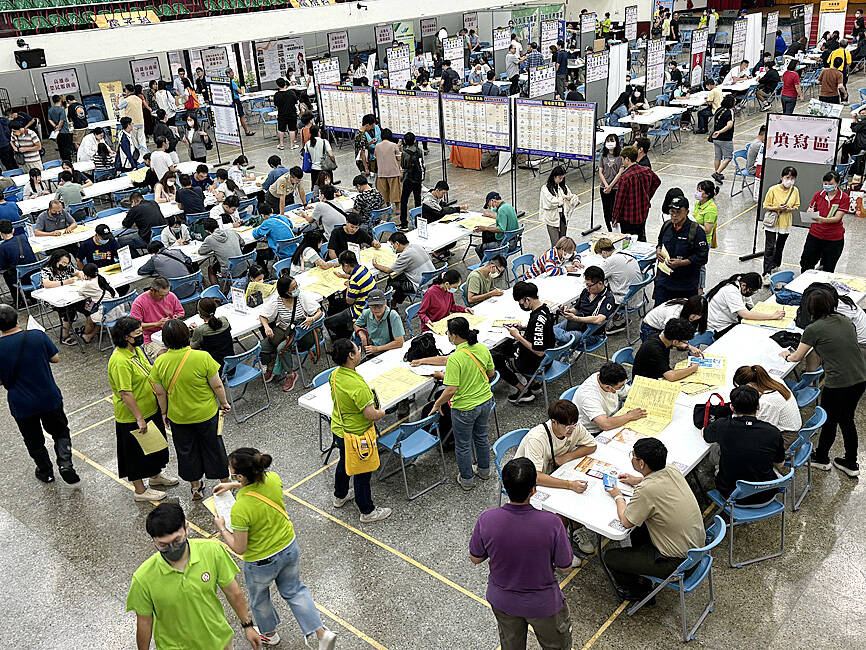The number of workers in Taiwan placed on furlough or unpaid leave programs increased slightly in the first half of this month as a couple of employers in the old economy sector reported a fall in export orders, Ministry of Labor data showed.
Data compiled by the ministry on Friday showed that the number of furloughed workers in Taiwan rose to 4,617 as of Thursday last week, up 180 from the 4,437 at the end of last month, while the number of employers who implemented unpaid leave programs also rose by 20 to 268 in the first half of the month.
The increase in furloughed workers largely came after two employers in the metal and electric machinery industry put more employees on unpaid leave, Labor Conditions and Equal Employment Division deputy head Wang Chin-jung (王金蓉) said.

Photo courtesy of the Kaohsiung Bureau of Labor Affairs
Each of the two companies — one machine-tool supplier and one bicycle parts maker — placed about 100 people on furlough in the 15-day period, due to a drop in export orders, Wang said.
It was not the first time that the two employers reported furlough programs to the ministry, she said.
As of Thursday, the number of furloughed workers in the export-oriented manufacturing sector rose to 3,678, from 3,573 at the end of last month.
Meanwhile, furloughed workers in the support service industry, which is comprised of travel agencies, rose from 45 at the end of last month to 59, and the figure for lodging, and food and beverage industries also rose from 341 to 371, the ministry’s data showed.

When an apartment comes up for rent in Germany’s big cities, hundreds of prospective tenants often queue down the street to view it, but the acute shortage of affordable housing is getting scant attention ahead of today’s snap general election. “Housing is one of the main problems for people, but nobody talks about it, nobody takes it seriously,” said Andreas Ibel, president of Build Europe, an association representing housing developers. Migration and the sluggish economy top the list of voters’ concerns, but analysts say housing policy fails to break through as returns on investment take time to register, making the

NOT TO WORRY: Some people are concerned funds might continue moving out of the country, but the central bank said financial account outflows are not unusual in Taiwan Taiwan’s outbound investments hit a new high last year due to investments made by contract chipmaker Taiwan Semiconductor Manufacturing Co (TSMC, 台積電) and other major manufacturers to boost global expansion, the central bank said on Thursday. The net increase in outbound investments last year reached a record US$21.05 billion, while the net increase in outbound investments by Taiwanese residents reached a record US$31.98 billion, central bank data showed. Chen Fei-wen (陳斐紋), deputy director of the central bank’s Department of Economic Research, said the increase was largely due to TSMC’s efforts to expand production in the US and Japan. Investments by Vanguard International

WARNING SHOT: The US president has threatened to impose 25 percent tariffs on all imported vehicles, and similar or higher duties on pharmaceuticals and semiconductors US President Donald Trump on Wednesday suggested that a trade deal with China was “possible” — a key target in the US leader’s tariffs policy. The US in 2020 had already agreed to “a great trade deal with China” and a new deal was “possible,” Trump said. Trump said he expected Chinese President Xi Jinping (習近平) to visit the US, without giving a timeline for his trip. Trump also said that he was talking to China about TikTok, as the US seeks to broker a sale of the popular app owned by Chinese firm ByteDance Ltd (字節跳動). Trump last week said that he had

STRUGGLING TO SURVIVE: The group is proposing a consortium of investors, with Tesla as the largest backer, and possibly a minority investment by Hon Hai Precision Nissan Motor Co shares jumped after the Financial Times reported that a high-level Japanese group has drawn up plans to seek investment from Elon Musk’s Tesla Inc to aid the struggling automaker. The group believes the electric vehicle (EV) maker is interested in acquiring Nissan’s plants in the US, the newspaper reported, citing people it did not identify. The proposal envisions a consortium of investors, with Tesla as the largest backer, but also includes the possibility of a minority investment by Hon Hai Precision Industry Co (鴻海精密) to prevent a full takeover by the Apple supplier, the report said. The group is